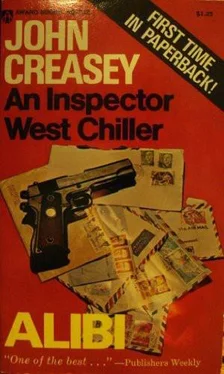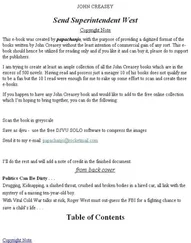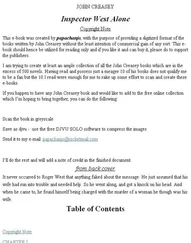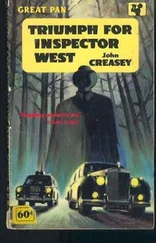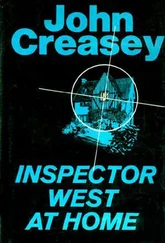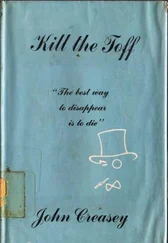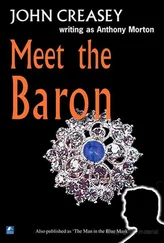John Creasey - Alibi
Здесь есть возможность читать онлайн «John Creasey - Alibi» весь текст электронной книги совершенно бесплатно (целиком полную версию без сокращений). В некоторых случаях можно слушать аудио, скачать через торрент в формате fb2 и присутствует краткое содержание. Жанр: Старинная литература, на русском языке. Описание произведения, (предисловие) а так же отзывы посетителей доступны на портале библиотеки ЛибКат.
- Название:Alibi
- Автор:
- Жанр:
- Год:неизвестен
- ISBN:нет данных
- Рейтинг книги:4 / 5. Голосов: 1
-
Избранное:Добавить в избранное
- Отзывы:
-
Ваша оценка:
- 80
- 1
- 2
- 3
- 4
- 5
Alibi: краткое содержание, описание и аннотация
Предлагаем к чтению аннотацию, описание, краткое содержание или предисловие (зависит от того, что написал сам автор книги «Alibi»). Если вы не нашли необходимую информацию о книге — напишите в комментариях, мы постараемся отыскать её.
Alibi — читать онлайн бесплатно полную книгу (весь текст) целиком
Ниже представлен текст книги, разбитый по страницам. Система сохранения места последней прочитанной страницы, позволяет с удобством читать онлайн бесплатно книгу «Alibi», без необходимости каждый раз заново искать на чём Вы остановились. Поставьте закладку, и сможете в любой момент перейти на страницу, на которой закончили чтение.
Интервал:
Закладка:
Supposing he checked that with Artemeus before he made a decision?
He thrust the thought aside. He hadn’t even decided whether to tell Janet about the offer, hadn’t decided whether he wanted the job, good though it was. He had to decide on the strength of his feeling for or against the Yard, not on one issue which was a long way from being typical. There were short term things he had to do; among them, see Rapelli.
But first, the Yard.
He heard Janet hurrying down the stairs, went to the foot of them and called, “Can I give you a lift?”
“Oh, darling, if you would.” Janet’s eyes lit up. “I’m going to a committee meeting at the Town Hall, if you could just drop me off there.”
Ten minutes later he leaned across and opened the door for her, vividly reminded of doing exactly that for Maisie Dunster only a few hours ago, only a few hundred yards away from here. He did not dwell on that, but drove quickly to the Yard through thick traffic. The day was warm, the exhaust fumes were strong, it was the kind of day when anyone who had to work indoors was likely to be bad-tempered.
There was a kind of lethargy about the Yard, and a noticeable slackness among both senior and junior officials who were in the passages. With Coppell on the spot no one slouched, few groups gathered in the passages, but with Coppell away . . .
Roger wondered whether he himself would behave any differently in such circumstances, and decided that Coppell or no Coppell, he would behave in exactly the same way. Wasn’t that what most of this trouble was about?
Danizon, jacket off, was in his, Roger’s, office.
“Good morning, sir,” he welcomed. “Still all clear. Very little of any kind has come in during the night.” He pushed a thin file closer to Roger as he sat down. “Like some coffee, sir?”
“No, thanks,” Roger said, and opened the report folder.
Maisie Dunster hadn’t stirred from her flat according to two divisional men detailed to watch her. They had been relieved at eight o’clock and their place taken by others.
Pearson had gone home and had a tremendous quarrel with his wife; but neither of them had left the house since.
The post mortem on Ricardo Verdi showed that death had come from cerebral haemorrhage following a blow with a blunt instrument, compatible with an electric guitar.
The post mortem on Wilfred Smithson showed that death had followed multiple injuries to the head, chest and stomach, likely to be caused by being struck by a moving car.
There was as yet nothing to suggest that Verdi and Rapelli were old friends or associates, or even that they had known each other. There was plenty of evidence that Maisie Dunster had known both, however; some that Verdi as well as Rapelli had received her favours. As far as the police could find out, only two persons had known practically all the people involved. One was Patrick Fogarty and the other was Maisie. Yet there were no new revelations about either. The main inexplicable factor, however, was that Hamish Campbell had switched sides with such alacrity. Had Rachel Warrender been right? Had he been bribed? If so, how had Rachel—or her enquiry agent—discovered what the police, so far, had failed to discover? There was another question which, deliberately, he had not asked for. Did she know that Rapelli had planned to attack Verdi, even arranging his “alibi” in advance?
Roger pondered these questions, soaked up all that was new in the reports, then put his head round the door of Danizon’s office, and said, “I’m going over to Brixton to see Rapelli.” He closed the door on Danizon’s “Right, sir.” Danizon would warn the authorities at the prison that he was on the way and Rapelli would probably be out of his cell and in one of the interviewing rooms at the front of the building.
He was at Brixton at a little before one o’clock.
Keys clanked, steel-capped boots clattered on cobbles, even in the sunlight the walls looked grim and grey. The big open courtyard was comparatively cool and the first big hall into which Roger was taken was almost chilly.
So was Rapelli’s manner.
He looked fit and rested, and there was a haughtiness about him which Roger hadn’t noticed before. He denied bribing Maisie or anyone else. He denied being at the Doon Club. He denied striking Verdi over the head. He denied everything.
“Whoever has told you these things is a liar,” he said flatly.
“But we can prove beyond doubt that you were at the Doon Club,” Roger insisted.
“No one. not even the great Superintendent West, can prove what isn’t true,” said Rapelli. “Whoever was there, it was not I.”
“Where are you getting the money from?” demanded Roger.
“I have no money. Miss Warrender made no charge for her help, and the other people are liars.” Rapelli’s voice was pleasant-sounding but just now tinged with bitterness. “The biggest liar is the woman, Dunster. I was with her before the others came in. First she admitted that, then she told a lie. Why don’t you go and worry her with your questions? You might get the truth out of her if you try.”
Roger left the prison at ten minutes to two, wholly dissatisfied. Now the weather was not only hot but sultry and he thought he heard thunder in the distance, while the sky was a metallic blue. He drove towards Westminster Bridge in thick traffic, and was at the far side, waiting at the traffic lights which protected the approach to Parliament Square when he heard his name on the crackling radio. A dozen other names had been almost inaudible, but he recognised his own in a flash, and switched to Information.
“This is Superintendent West,” he said. “I am at Parliament Square heading for the Yard. Will the message keep?”
“I doubt if you’ll think so, sir,” Information said. “A flash has just come in from division that Maisie Dunster has been found in her apartment, badly injured. A pretty messy business, they say.”
Roger felt himself going cold, and it was some time before he answered, roughly, “I’ll go to her flat right away.”
Chapter Sixteen
DYING STATEMENT
As Roger turned into the terrace where Maisie lived, an ambulance appeared from the other direction, white and shining. There were four police cars, three of them double-parked. Roger pulled up behind the third and jumped out, becoming one of a crowd of thirty or forty people being pushed back by two policemen. Men and women were at windows and doorways and gates; there was even a youth on a roof.
“Back a few yards, please,” one policeman was intoning.
“Make room for the ambulance, please.”
“Make room . . . Back a few yards . . . Make room . . .”
Roger pushed his way through the crowd which was showing neither resentment nor eagerness at being pushed back. He found himself confronted by a massive policeman whose huge hand was spread out, palm outwards; he touched but did not push Roger.
“Please go back, sir.”
“All right, constable, let me through,” Roger ordered.
“If you’re a relative—” The man turned a big, weather- browned face towards him. Recognising Roger, his eyebrows rose comically. “Oh, Superintendent! Please pass through, sir.”
Two ambulance men were on their way across the small garden with its table-smooth lawn; there were no flower beds. A policeman stood at the front door. Suddenly, pushed out ahead of the ambulance men, was a big, lean, hungry-looking man with high and shiny cheekbones and big and shiny nose. This was the Divisional Superinten-dent, Abe Court. He had big eyes with stubby eyelashes so black that it almost looked as if he wore eye shadow.
He espied Roger.
“Hallo, Superintendent.” He shook hands.
Читать дальшеИнтервал:
Закладка:
Похожие книги на «Alibi»
Представляем Вашему вниманию похожие книги на «Alibi» списком для выбора. Мы отобрали схожую по названию и смыслу литературу в надежде предоставить читателям больше вариантов отыскать новые, интересные, ещё непрочитанные произведения.
Обсуждение, отзывы о книге «Alibi» и просто собственные мнения читателей. Оставьте ваши комментарии, напишите, что Вы думаете о произведении, его смысле или главных героях. Укажите что конкретно понравилось, а что нет, и почему Вы так считаете.
